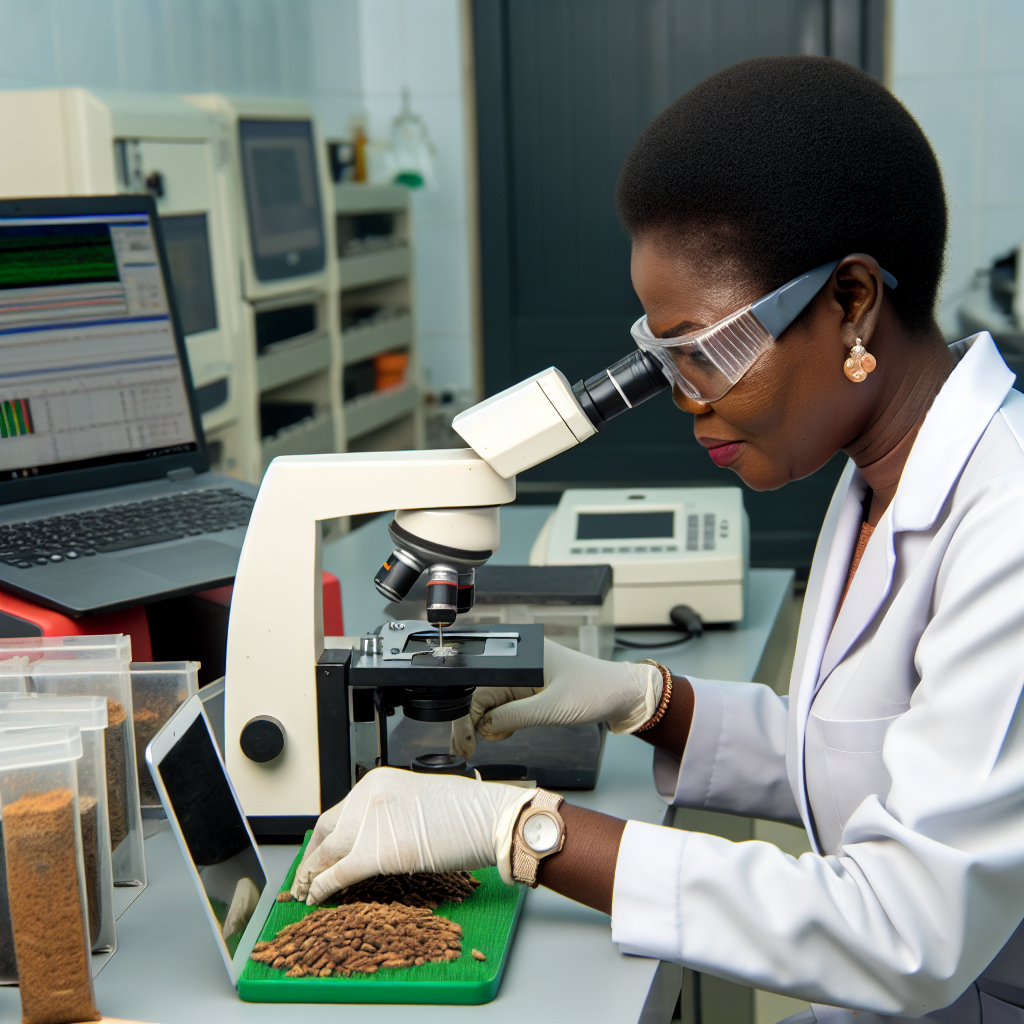Introduction:
Nigerian agricultural science plays a vital role in the country’s economy.
Technology has revolutionized agricultural practices in Nigeria.
These advancements have led to increased productivity and efficiency.
Technology in agriculture has enabled Nigerian farmers to adopt modern farming techniques.
This has improved crop yield and quality significantly.
Incorporating technology such as soil sensors and drones has allowed farmers to monitor soil moisture levels.
Additionally, farmers can identify areas for improvement during the growing season.
The use of modern machinery and equipment has increased the speed and accuracy of planting and harvesting processes.
Moreover, access to information and resources through mobile apps has enabled farmers to make informed decisions.
This accessibility has also streamlined market access for the farmers.
The implementation of precision farming techniques helps optimize resources such as water and fertilizer.
These approaches lead to sustainable agricultural practices in Nigeria.
Overall, technology has been instrumental in transforming Nigerian agricultural science.
This transformation makes agriculture more efficient, productive, and sustainable for the future.
Nigeria’s Agricultural Potential
Nigeria is a country with vast agricultural potential.
However, the current state of its agricultural industry is facing numerous challenges.
Farmers in Nigeria are struggling with various issues that hinder their productivity.
They are unable to meet the growing demands of the population.
The impact of traditional farming methods on productivity is significant.
This highlights the need for modernization in the agricultural sector.
Challenges Faced by Farmers in Nigeria:
- Lack of access to modern farming equipment and technology
- Inadequate infrastructure for transportation and storage of agricultural produce
- Poor access to credit and financial services for investment in agriculture
- Climate change and its unpredictable effects on agriculture
- Pests and diseases affecting crops and livestock
Impact of Traditional Farming Methods on Productivity:
Traditional farming methods in Nigeria are labor-intensive.
They often result in low yields.
Farmers rely on age-old practices that are inefficient.
These methods are unsustainable in the long run.
The lack of technological advancements in agriculture has led to a decrease in productivity.
This decrease also affects the profitability for farmers.
Additionally, traditional farming methods contribute to soil degradation.
This leads to environmental damage, further limiting the potential for sustainable agriculture.
Need for Modernization in the Agricultural Sector:
- Adoption of modern farming techniques and equipment to increase efficiency
- Implementation of advanced irrigation systems to combat water scarcity
- Utilization of innovative technologies such as drones and satellite imaging for precision agriculture
- Integration of ICT solutions for real-time monitoring of crops and livestock
- Promotion of sustainable farming practices to ensure long-term food security
The role of technology in Nigerian agricultural science is crucial.
It is vital for the modernization and development of the agricultural sector.
By overcoming the challenges faced by farmers, productivity can improve.
Using advanced farming methods and embracing innovation in agriculture can lead Nigeria to food security.
This can also contribute to economic growth and sustainable development for the future.
Use of drones for crop monitoring and surveillance
In recent years, the role of technology in Nigerian agricultural science has become increasingly prominent.
One of the key technological advancements that have revolutionized the way farmers monitor and manage their crops is the use of drones.
Drones have proven to be valuable tools for crop monitoring and surveillance.
They allow farmers to obtain real-time data on crop health, pest infestations, and other crucial information.
Implementation of precision agriculture techniques
Precision agriculture techniques involve the use of advanced technologies such as GPS, sensors, and data analytics to optimize farming practices.
In Nigeria, precision agriculture has enabled farmers to increase crop yields, reduce input costs, and minimize environmental impact.
By leveraging technology, farmers can precisely manage inputs like water, fertilizer, and pesticides.
Transform Your Career with Expert Guidance
Get personalized mentorship consulting that’s tailored to your unique path. Our expert advice is actionable and exclusive.
Get StartedThis leads to more efficient and sustainable farming practices.
Integration of data analytics and machine learning in farming practices
Another significant aspect of the role of technology in Nigerian agricultural science is the integration of data analytics and machine learning in farming practices.
By analyzing large datasets, farmers can gain valuable insights into crop performance, weather patterns, and market trends.
Machine learning algorithms can help predict crop yields, optimize planting schedules, and even detect early signs of crop diseases.
This data-driven approach to farming not only improves productivity but also allows farmers to make more informed decisions.
Such decisions enhance overall agricultural sustainability.
Discover More: Comparative Analysis: Nigerian and Global Agri-Economics
Advantages of technology adoption in agriculture:
Increased crop yields and productivity.
Reduction in wastage and losses.
Improvement in farmer income and livelihood.
Technology plays a crucial role in revolutionizing the agricultural sector in Nigeria.
The adoption of modern technologies has brought numerous benefits to farmers and the overall agricultural landscape in the country.
Increased crop yields and productivity
One of the most significant advantages of technology adoption in agriculture is the substantial increase in crop yields and productivity.
With the use of technologies such as improved seeds, fertilizers, pesticides, and machinery, farmers are able to achieve higher yields per acre of land.
This not only ensures food security for the growing population but also boosts the overall agricultural output of the country.
Reduction in wastage and losses
Another key benefit of incorporating technology in agriculture is the significant reduction in wastage and post-harvest losses.
Modern technologies such as irrigation systems, storage facilities, and transportation networks help farmers preserve their produce and ensure that it reaches the market in optimal condition.
This not only minimizes financial losses for farmers but also contributes to the overall efficiency of the agricultural supply chain in Nigeria.
Improvement in farmer income and livelihood
By adopting technology in agriculture, farmers in Nigeria have seen a substantial improvement in their income and livelihood.
With higher crop yields, reduced losses, and improved market access, farmers are able to earn more from their produce and secure a better standard of living for themselves and their families.
This economic empowerment of farmers plays a crucial role in alleviating poverty and enhancing rural livelihoods in the country.
Gain More Insights: Research Trends in Nigerian Agricultural Economics
Government initiatives and support for technology in agriculture:
The role of technology is crucial for enhancing agricultural productivity and efficiency in Nigeria.
In recent years, the government has implemented several initiatives to support the use of technology in agriculture.
Launch of various agricultural technology programs and projects
The government has launched numerous programs and projects aimed at promoting the adoption of technology in agriculture.
These initiatives include introducing mobile applications for farmers to access market information, weather updates, and best practices.
Additionally, the government has initiated establishing agricultural innovation hubs to facilitate the development and dissemination of technology solutions for farmers.
These hubs serve as centers for research, training, and technology transfer to improve agricultural practices.
Provision of funding and incentives for farmers to adopt technology
In order to encourage farmers to integrate technology into their farming operations, the government provides funding and incentives.
This includes grants, subsidies, and loans to support the purchase of equipment, tools, and technologies that enhance productivity and efficiency.
Furthermore, the government offers tax incentives and exemptions to technology companies and startups operating in the agricultural sector.
This is aimed at promoting innovation and driving technological advancements in agriculture.
Collaboration with tech companies and research institutions to drive innovation
The government has actively collaborated with technology companies and research institutions to drive innovation in Nigerian agriculture.
These partnerships have led to the development of new technologies, such as precision farming tools, drones for crop monitoring, and soil sensors for improved nutrient management.
Research institutions have also played a vital role in conducting studies and experiments to assess the impact of technology on agricultural practices.
Findings from these studies inform policy decisions and strategic plans for the integration of technology in agriculture.
The government’s initiatives and support for technology in agriculture have significantly contributed to the modernization and advancement of the agricultural sector in Nigeria.
By fostering collaboration, providing funding, and launching innovative programs, the government is paving the way for a more sustainable and productive agricultural industry.
Explore Further: Internship Opportunities for Animal Science Students

Success stories and case studies of technology implementation in Nigerian agriculture:
- Examples of farmers using technology to improve their yields
- Impact of technology on smallholder farmers and rural communities
- Testimonials from stakeholders in the agricultural industry
Farmers in Nigeria have been leveraging technology to enhance their agricultural practices.
This has led to significant improvements in their crop yields.
For instance, the use of mobile apps that provide real-time weather forecasts helps farmers make informed decisions regarding planting and irrigation schedules.
Additionally, the adoption of precision agriculture techniques, such as GPS-guided tractors and drones for aerial monitoring, has enabled farmers to optimize their use of resources and minimize wastage.
This has resulted in increased productivity and profitability for many farmers across the country.
Impact of technology on smallholder farmers and rural communities:
The introduction of technology in Nigerian agriculture has had a profound impact on smallholder farmers and rural communities.
By providing access to information, market prices, and agricultural best practices, technology has empowered these farmers to make more informed decisions and improve their productivity.
Furthermore, the use of mobile payment systems has facilitated financial transactions for smallholder farmers, reducing the risks associated with carrying cash and enabling them to access credit and savings services.
This has improved the financial inclusion of rural communities and contributed to poverty alleviation.
Testimonials from stakeholders in the agricultural industry:
Several stakeholders in the Nigerian agricultural industry have attested to the positive outcomes of integrating technology into farming practices.
Farmers have reported higher crop yields, better pest and disease management, and improved access to markets thanks to technological innovations.
Agricultural extension workers have also noted the effectiveness of using digital platforms to disseminate information and provide training to farmers.
This has resulted in increased adoption of modern farming techniques and improved livelihoods for rural communities.
Overall, the feedback from stakeholders has been overwhelmingly in favor of embracing technology in Nigerian agriculture.
Discover More: Bioinformatics Conferences and Workshops in Nigeria
Impact of Technology on Nigerian Agriculture
Technology is revolutionizing Nigerian agricultural science.
This revolution increases productivity and efficiency.
It is evident that technology plays a crucial role.
This transformation leads to improved yields.
Farmers benefit from better livelihoods.
We urge all stakeholders to embrace technology.
This includes the government, private sector, and farmers.
Support for modern technological tools is essential.
By investing, Nigeria can achieve food security.
Investment will also increase revenue and boost development.
The future outlook for technology integration is promising.
Advancements in artificial intelligence show potential.
Data analytics can enhance farming techniques.
Precision farming will lead to further growth and sustainability.
All players must work together for success.
Harnessing technology’s full potential is crucial.
Additional Resources
Chinese Academy of Tropical Agricultural Sciences Important news …
Technological innovation and technical entrepreneurship for the …




